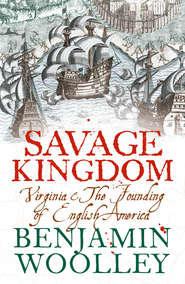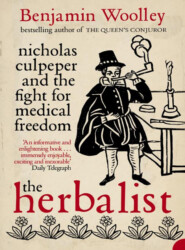По всем вопросам обращайтесь на: info@litportal.ru
(©) 2003-2024.
✖
The Queen’s Conjuror: The Life and Magic of Dr. Dee
Настройки чтения
Размер шрифта
Высота строк
Поля
(#litres_trial_promo)
On 16 February he was invited to Westminster Palace. He approached her in the palace gallery, Elizabeth’s preferred location for informal, unscheduled and confidential meetings, as she could pick out from the courtiers hovering nervously those she wished to talk to. Today it was her philosopher’s turn and their conversation quickly moved on from a discussion of the Propaedeumata’s astronomical findings to something more sensational. He revealed to her ‘the great secret for my sake to be disclosed unto her Majesty by Nicolaus Grudius Nicolai, sometime one of the Secretaries to the Emperor Charles the Fifth’.
(#litres_trial_promo) He never let on what this secret was, and little is known about Grudius, a Belgian poet. Dee noted his death in 1569 in one of his books, describing him as a ‘friend’. They also shared the same publisher in Antwerp, Willem Silvius.
(#litres_trial_promo) The assumption is that Grudius’s secret related to alchemy, a recurring interest among European monarchs desperate to find easier ways of filling coffers regularly depleted by wars.
The promise of such mystical revelations undoubtedly drew Elizabeth to Dee and her appetite for them drew him to her. Elizabeth had a profound sense of the forces of the cosmos acting upon her, and regarded her monarchical powers as magical in some way. For example, she was an enthusiastic practitioner of the ‘royal touch’. In this rite, which had origins reaching back at least to the reign of Henry II, a monarch would touch the neck of a sufferer of epilepsy or scrofula (a painful and disfiguring inflammation of the lymph glands which was also known as ‘the king’s evil’), who would then be cured. Elizabeth’s touch appeared so effective, it was often cited as vindication of her claim to the throne and proof that the Pope’s attempt to excommunicate her had been vetoed by God.
Not all the water in the rough rude sea
Can wash the balm off from an anointed king,
…as Shakespeare put it.
(#litres_trial_promo)
Dee understood better than anyone how the magical balm worked. He could help Elizabeth make the most of it and become an adept at the magical practice of monarchy. However, as he was to discover, even these powers were not enough to levitate him above life’s necessities.
XI (#ulink_b5443915-f390-5156-bd41-9cc975690505)
Light miles upstream from the city of London along the Thames’s meandering course lies the village of Mortlake. According to dubious tradition, its name means ‘dead lake’. No such lake exists there now, nor in recorded history, though in the distant past one may have gathered on the bend of the river, a dark pool perhaps fouled with the rotting remains of plague or war victims. A less picturesque explanation, suggested by Daniel Lysons in his 1792 survey of London, is that the name comes from the Saxon ‘mortlage’, meaning a compulsory law.
(#litres_trial_promo)
The village that Lysons described in the late eighteenth century was much as it had been in the sixteenth, a small community that had expanded gently over the centuries. It served the stream of river and road traffic that passed by every day, delivering goods and travellers between London and the towns and palaces upstream. Two thousand acres in size, part of the manor of Wimbledon, it comprised a modest church, a cluster of houses mostly concentrated along the Thames tow-path, and a few asparagus fields.
Even without its dead lake, Lysons found that Mortlake had its local legends. One was recorded by Raphael Holinshed, a contemporary of Dee’s and source for Shakespeare’s history plays, who wrote of a monstrous fish caught there in 1240. Another legend Lysons mentioned was that the village had once held the extraordinary library and laboratory of the great conjuror John Dee.
In 1672, Elias Ashmole, planning a biography of Dee which was never written, visited Mortlake to interview the village’s oldest inhabitant, eighty-year-old Goodwife Faldo, who was the last surviving link with the time Dee lived there.
Her memories were vivid. Dee was ‘very handsome’, tall and slender with a fair complexion, smartly dressed in an ‘artists’ gown’ with hanging sleeves, and sporting a long ‘picked’ (pointed) beard which in old age turned snowy white. Faldo recalled how children ran screaming from him because he was ‘accounted a conjuror’, how he would act as a ‘great Peacemaker’ among squabbling adults, and how neighbours would ask his advice on the most trifling domestic problems.
Faldo remembered an incident concerning a basket of pewter tableware that had been sent to London to be polished for a wedding. The job done, the basket was delivered to a prearranged spot on the banks of the Thames to be collected by the boatman Robert Bryan. But Bryan took the wrong basket, and the furious owner found his gleaming pewter substituted by beef tripe. By means that Faldo could not fathom, Dee directed the hapless boatman to a woman in nearby Wandsworth. It turned out the tripe was hers, and she told Bryan he would find the plate still sitting by the river, as she had found it too heavy to carry home.
This ambiguous image of the cunning wizard and wise seer was enhanced by Dee’s impressive connections with foreigners and powerful courtiers. Many such figures came through Mortlake, en route between the Queen’s palaces at Westminster, Greenwich, Richmond, Nonsuch and Hampton Court. Faldo recalled Dee frequently visiting nearby Barn Elms, the home of Sir Francis Walsingham and later the Earl of Essex, Queen Elizabeth’s most rebellious favourite and husband of Walsingham’s daughter Frances. Dee had also once taken Faldo and her mother to Richmond Palace, so they could watch a royal dinner with the King of Denmark.
At the age of just six, Faldo (and her mother) had been invited into Dee’s home, where in a darkened room he showed them the image of a solar eclipse projected through a pinhole.
(#litres_trial_promo) Despite the reactions of the village’s other children, Faldo seemed quite unafraid of entering Dee’s strange world of ancient manuscripts, intricate devices and chemical smells, walking into the labyrinthine corridors of what by then had become one of the most extraordinary residences in Europe.
Dee had moved to Mortlake out of necessity. Despite the Queen’s welcome on his return from the Continent in 1564, he found life in England far from convivial. The Marchioness of Northampton, whom he had escorted back from Antwerp, had secured the promise of the deanery of Gloucester when it fell vacant, as was imminently expected. It was just the sort of post he needed, promising to provide him with the secure and undemanding living he needed to continue his philosophical work. However, in April 1565, when the marchioness finally succumbed to breast cancer, so did his claim to the deanery. Such offices were entangled with growing antagonisms at court, the tensions between Robert Dudley (just made Earl of Leicester), the leader of the militant Protestant faction and the Duke of Norfolk, the nation’s most senior peer and focus of Catholic sympathies. Dee’s religious loyalties were not delineated clearly enough to arouse the support of either, so he was swept aside in favour of John Man, a radical Protestant who later became Bishop of Gloucester.
Dee did not help the situation by being so inept at cultivating aristocratic patrons. He attended court irregularly, and then only to see the Queen. Robert Dudley had known Dee when he was appointed to the household of his father the Duke of Northumberland in 1553, and would have been an excellent potential benefactor, yet Dee did not dedicate a single work to him. Rather, he eulogised Robert’s brother John, Earl of Warwick, in his Mathematicall Praeface, who had died in 1554.
He seemed to put as much effort into befriending Elizabeth’s servants as her courtiers, welcoming both her Italian dwarf, Tomasina and a ‘Mr Fosku’ of the Queen’s wardrobe to Mortlake.
His hopes that the Queen herself might offer him a post as court philosopher were wildly optimistic. There was certainly a demand for philosophical advice of all sorts: astrological, alchemical, theological, even medical. When a wax effigy of Elizabeth stuck with pig bristles was found under a tree in Lincoln’s Inn Fields; when a ‘blazing star’ appeared in the sky; when the Queen fell sick with a mysterious illness – it was Dee who was called upon to advise. Even on strategic matters, such as the maintenance of a navy or the management of trade, he could expect an eager audience. But whenever the court summoned him, it was as a diligent subject not a paid professional. Only the sophisticated and lavish households of Continental monarchs could afford professional court philosophers. In England, they were considered an unnecessary luxury. For there were Ladies-in-Waiting, Gentlemen-of-the-Wardrobe, even Grooms-of-the-Stool, but no masters of philosophy.
Вы ознакомились с фрагментом книги.
Приобретайте полный текст книги у нашего партнера:
Приобретайте полный текст книги у нашего партнера:







